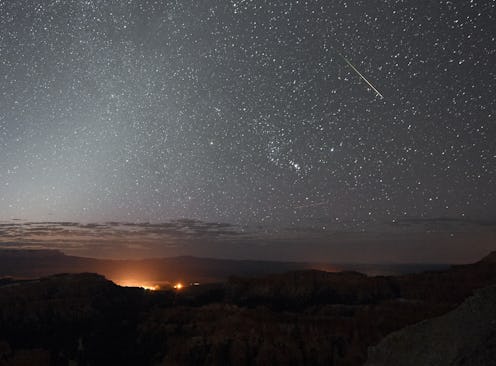News
Don't Miss Tonight's Meteor Shower
Trust us, you won't want to miss Friday night's meteor shower, expected to be a truly awesome, possibly historic event. Named Camelopardalis, after what's colloquially known as the Giraffe constellation, the shower's predicted to start early Friday evening and extend into early Saturday morning, dazzling us all with a cosmic display predicted to rival that of last August's dazzling Perseid meteor shower. It'll be the first time we've ever observed the shower, the meteors originating from a comet discovered just ten years ago.
So how best to settle in and watch? It seems simple enough to watch something happening in the sky, but meteor showers are unpredictable and tenuous things. Even with the predictions of astronomers, there's no guarantee how visible the meteor shower will be, thanks to sky conditions throughout and the fundamentally unpredictable nature of such a cosmic event.
Rest assured, as Slate 's astronomer Phil Plait points out, you'll be watching in safety and security — the comet from which the meteors will be falling is going to miss the Earth by a wide margin. So don't fret — just grab a snack and kick back. Here's what you gotta know...
The Show Should Kick Off Around 10:30 P.M. ET
That's the best estimate put forth by NASA, though it'll be longer still until the projected peak of the shower's intensity — that's thought to be coming in the early hours of Saturday morning, from 2 a.m. ET to 4 a.m. ET, a special treat reserved only for the most restless among us. It's all expected to die down by around 7 a.m. ET.
Not Sure Where to Look? Just Find the Giraffe!
The reason the entire meteor shower draws its clumsy moniker from the Camelopardalis, or giraffe constellation, is that that's the area of the sky from which the meteors will appear to originate. So if you're able to fix your eyes to it — it's quite near to the North Star, hanging in the sky above the North Pole — you should have a pretty good chance to see some celestial fireworks.
For first-hand viewing, it's strictly a northern hemisphere affair, however, which is sad. And, all the more reason not to take it for granted. But there's another option, if you can't actually see it with your own eyes...
Watch the Meteors Come Down Via A Live Stream
Courtesy of the fine people behind robotic telescope Slooh, you can watch the scene from anywhere you've got a decent internet connection — they'll be live streaming it all from their outpost on the Canary Islands.
Don't Forget Your Sense of Natural Wonder
We can't be the only ones so bowled over by the grandeur of the universe, can we? It's all so dramatic, and bold, and stunning that time spent simply sitting and idly stargazing can feel well-spent. And when the cosmos comes out to play, all the better.
